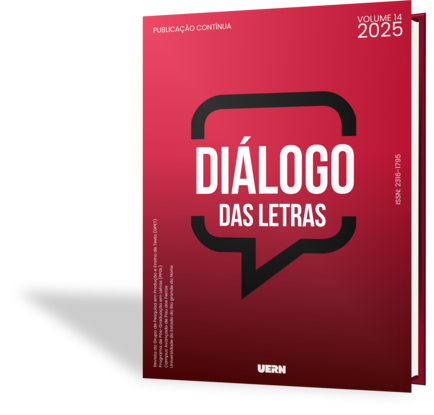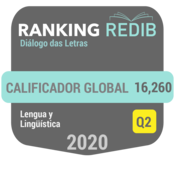Representação dos falantes em materiais didáticos de ensino de língua inglesa: idealização do nativo e da cultura anglo-americana
DOI:
https://doi.org/10.22297/2316-17952025v14e02508Palavras-chave:
Idealização, Materiais didáticos, Ensino de língua inglesaResumo
Este trabalho tem como objetivo analisar manifestações do imperialismo linguístico em materiais didáticos voltados ao ensino de língua inglesa. No campo do ensino linguístico, tais materiais podem funcionar como instrumentos de reprodução de ideais de supremacia e hierarquização cultural (Kumaravadivelu, 2012). Observa-se uma tendência na didática do inglês em enfatizar a vida cotidiana, os valores e comportamentos do falante nativo, sobretudo das culturas estadunidense e britânica, com propósitos imperialistas (Phillipson, 1992; Pennycook, 2002; Kumaravadivelu, 2003; Siqueira, 2012). Nesse contexto, o presente estudo objetivou investigar como a representação dos falantes é construída nesses materiais, no que tange a representações imperialistas. Para tanto, aplicou-se um questionário a professores de língua inglesa vinculados à 10ª Gerência de Ensino da Secretaria de Educação do Estado da Paraíba, a fim de identificar os materiais didáticos mais utilizados. Com base nos dados coletados, selecionou-se o corpus para análise, fundamentada nos pressupostos teóricos da Linguística Sistêmico-Funcional (Halliday, 1994) e da Linguística Aplicada Crítica (Moita Lopes, 1996; Pennycook, 1994; 2002; Rajagopalan, 2005; Siqueira, 2005, 2012). Os resultados indicam que os materiais didáticos analisados promovem uma representação idealizada dos falantes nativos, especialmente dos Estados Unidos e do Reino Unido, construindo suas culturas como modelos normativos, superiores e desejáveis. Além disso, evidencia-se a marginalização das variedades não nativas e de outras culturas, configurando uma naturalização das ideologias linguísticas coloniais presentes no ensino do inglês. Tal representação impacta diretamente as práticas pedagógicas e as concepções de docentes e aprendizes, reforçando noções de legitimidade linguística restritas à proximidade com o falante nativo.
Downloads
Referências
BRASIL. Ministério da Educação. Base nacional comum curricular. Brasília: MEC/SEB, 2017. Disponível em: http://basenacionalcomum.mec.gov.br/. Acesso em: 01 jun 2023.
CRYSTAL, D. English as a global language. USA: Cambridge University Press, 2003. DOI: https://doi.org/10.1017/CBO9780511486999
FREIRE, P. Educação e mudança. São Paulo: Paz e terra, 1979.
GRADDOL, D. English next: Why global English may mean the end of English as a foreign language. The British Council. London: The English Company (UK) Ltda, 2006.
HALL, S (ed). Representation: Cultural Representations and Signifying Practices. London, Thousand Oaks, New Delhi: Sage / Open University, 1997.
HALLIDAY, M.A.K. An introduction to functional grammar. 2 ed. London: Arnold, 1994.
KUMARAVADIVELU, B. Forum critical language pedagogy: Post-method perspective on English language teaching. World Englishes, v. 22, n. 4, p. 539-550, 2003. DOI: https://doi.org/10.1111/j.1467-971X.2003.00317.x. Acesso em: 20 out. 2024. DOI: https://doi.org/10.1111/j.1467-971X.2003.00317.x
KUMARAVADIVELU, B. Individual identity, cultural globalization, and teaching English as an international language: the case for an epistemic break. In: ALSAGOFF, L. et al. (org.). Principles and practices for teaching English as an international language. New York and London: Routledge, 2012. p. 9-27.
MATSUDA, A. Teaching Materials in EIL. In: ALSAGOFF, L. et al. (org.). Principles and practices for teaching English as an international language. New York and London: Routledge, 2012. p. 168-185.
MOITA LOPES, L. P. (org). Oficina de linguística aplicada. Campinas, SP: Mercado das Letras, 1996. p. 37-62.
MOREIRA, H.; CALEFFE, L. G. Metodologia da pesquisa para o professor pesquisador. 2. ed. Rio de Janeiro: Lamparina, 2008.
MOTTA, F. C. P.; ALCADIPANI, R.; BRESLER, R. B. A valorização do estrangeiro como segregação nas organizações. Revista de Administração Contemporânea, v. 5, n. spe, p. 59-79, 2001. DOI: https://doi.org/10.1590/S1415-65552001000500004. Disponível em: https://www.scielo.br/j/rac/a/Vvw4DYG5TDyHcSbf6cJrNXy/. Acesso em: 14 jul. 2024. DOI: https://doi.org/10.1590/S1415-65552001000500004
PENNYCOOK, A. The cultural politics of English as an international language. London: Longman, 1994.
PENNYCOOK, A. English and the discourses of colonialismo. Londres: Routledge, 2002. DOI: https://doi.org/10.4324/9780203006344
PHILLIPSON, R. Linguistic imperialism. Oxford: Oxford University Press, 1992.
RAJAGOPALAN, K. A geopolítica da língua inglesa e seus reflexos no Brasil: por uma política prudente e propositiva. In: LACOSTE, Y.; RAJAGOPALAN, K (org.). A geopolítica do inglês. São Paulo: Parábola Editorial, 2005. p. 135-159.
SEIDLHOFER, B. Understanding English as a lingua franca. Oxford, UK; China: Oxford University Press, 2011. DOI: https://doi.org/10.1002/9781405198431.wbeal0243
SIQUEIRA, S. O desenvolvimento da consciência cultural crítica como forma de combate à suposta alienação do professor brasileiro de inglês. Revista Inventário, n. 4, p. 1-27, jul. 2005. Disponível em: http://www.inventario.ufba.br/04/04ssiqueira.htm. Acesso em: 16 jul. 2024.
SIQUEIRA, S. Se o inglês está no mundo, onde está o mundo nos materiais didáticos de inglês? In: SCHEYERL, D.; SIQUEIRA, S. (org.). Materiais didáticos para o ensino de línguas na contemporaneidade: contestações e proposições. Salvador: EDUFBA, 2012. p. 311-353.
Downloads
Publicado
Como Citar
Edição
Seção
Licença
Copyright (c) 2025 Alyne Ferreira de Araújo, Edmilson Luiz Rafael

Este trabalho está licenciado sob uma licença Creative Commons Attribution 4.0 International License.
A Diálogo das Letras não se responsabiliza por conceitos e opiniões emitidos pelos autores, tampouco manifesta, necessariamente, concordância com posições assumidas nos textos publicados. Além disso, os dados e a exatidão das referências citadas no trabalho são de inteira responsabilidade do(s) autor(es). Ao submeterem seus trabalhos, os autores concordam que os direitos autorais referentes a cada texto estão sendo cedidos para a revista Diálogo das Letras; ainda concordam que assumem as responsabilidades legais relativas às informações emitidas.
























